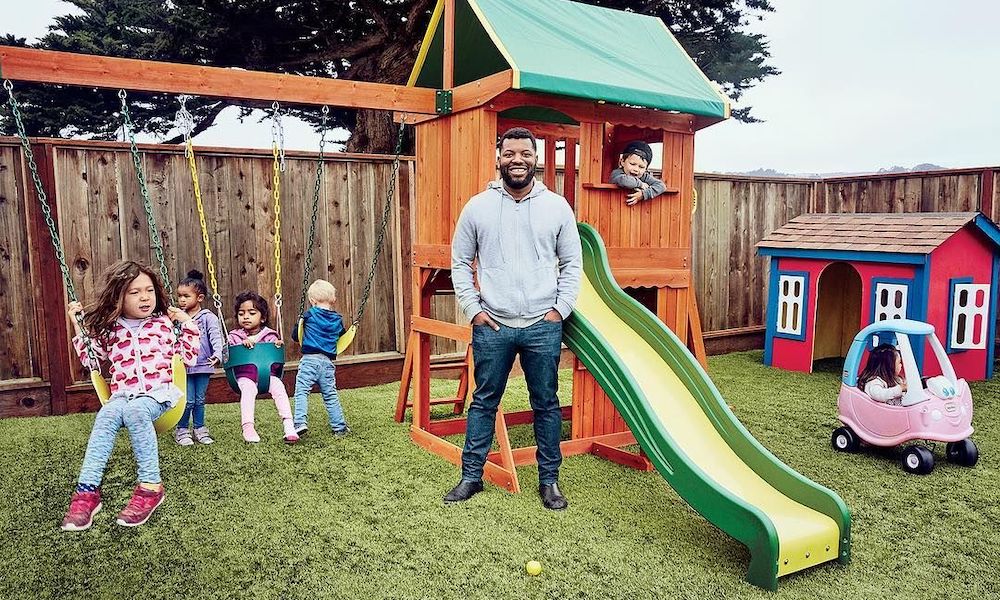
Wonderschool CEO and Co-founder Chris Bennett. Image via @Wonderschools on Instagram
The child care space is rife with myths: child care providers can’t earn a good living, the Montessori approach is the best, home-based programs aren’t as good as centers.
When he began exploring the child care industry, Wonderschool CEO and Co-founder Chris Bennett saw how these misconceptions and other barriers were holding back providers from building successful businesses and families from finding high-quality care. He realized there was an opportunity to create a business that met the needs of both these stakeholders and benefited society as a whole.
So how did he go from a spark of an idea to a venture-backed business?
In this Creative Confidence Podcast conversation, Chris takes us inside his human-centered process for building a business. We explore Chris’s journey in the making of Wonderschool, a company that helps child care providers start and run their own business, through the framework of IDEO U’s Designing a Business course: creating value, capturing value, and delivering value. Chris shares about building empathy with his customers, prototyping the business model, finding the right sales channels, guiding a team, and staying inspired and connected to the mission.
Listen on Spotify or Apple Podcasts
Creating value: Getting hands-on to understand customers’ needs
Chris heard there was a shortage of child care options in the San Francisco Bay Area, but noticed that home-based child care programs weren’t getting much exposure. He also found research showing investment in early childhood education reduces deficits and strengthens the economy. Plus, 90 percent of a child’s brain develops before the age of five. Parents wanted the best for their kids, which many thought meant a Montessori approach, when the research Chris found showed a variety of play-based approaches were effective. There was a clear need for better access to quality early child care to benefit kids, families and the community.
The best way for him to understand child care providers’ needs was to see their experiences firsthand. He called some providers to interview them and observe their businesses. Then he put an ad on Craigslist and found a few providers to partner with on getting their programs up and running. He helped them prepare their homes, go through the licensing process, fill out countless forms, design curriculum, and create effective marketing strategies. He was able to feel their anxiety through the process, see what blockers came up, and understand what parents and children wanted. He found that providers could earn a high income when they leveraged effective business and marketing tactics, but many lacked this expertise.
“Providers had blind spots and needed someone to show them how to present themselves in the best way,” Chris says of defining the value proposition for Wonderschool.
His early experiments helping child care providers start their businesses were the prototypes that shaped the final offer: a two-sided marketplace where providers could seek support and expand their reach and parents could come to find qualified care. The insights he gleaned in conversations with parents and providers drove their purpose: to dramatically increase access to high-quality early childhood care for all families.

A search on wonderschool.com for child care providers in San Francisco, CA.
Capturing value: Experimenting with revenue models
“Where there’s high complexity and high risk, there’s high reward,” Chris says of starting a business. When it came time to determine the pricing for Wonderschool’s offer, there were several factors to consider. He and his team took an experimental approach again.
In the first prototype where they partnered with a child care provider, the Wonderschool team focused on creating a great experience and learning how to craft a product that met their consumers' needs. In their second prototype, they tried out a revenue share model: Wonderschool would get 10 percent of any enrollments they brought to the provider. They tried the 10 percent model with three providers and followed their journeys closely. They were able to add a lot of value, helping the business owners earn much more than they would have otherwise.
At the same time, they explored customers’ willingness to pay by trying out higher and lower revenue shares. ”I’m all about experimenting,” Chris says of finding the right model. “Asking the customer how much they value something and how much they would pay for it.” Then iterate based on that feedback, keeping an eye on conversion. “I encourage my sales and product teams to be open to adjusting based on what they’re hearing from our customers,” Chris says.
As Wonderschool grew, providers that had been with them from the start were growing too. As they expanded to multiple locations and more students, their needs changed. Wonderschool adjusted the business model for those initial providers, adding components like insurance and loans and lowering the amount of revenue share in conjunction. Different pricing models emerged for customer segments.
“Where there’s high complexity and high risk, there’s high reward.”
Chris Bennett
Delivering value: Partnering to scale and seeking sustainable growth
Chris and the Wonderschool team did a lot of work to build out the brand early on. Digital marketing efforts helped build SEO, and word of mouth from happy customers drives much of their growth. Now, they’re expanding through partnerships with cities, governments and employers. The State of New Mexico recently partnered with Wonderschool to roll out the program statewide. Employer partners can offer their staff the valuable benefit of better access to early childhood education while enabling Wonderschool to expand their reach to more parents, which in turn drives growth for the child care providers on their platform.
When deciding what needs and growth opportunities to prioritize, Chris uses a framework that marries sustainability, quality and financial performance. As a venture-backed company, they’re measured by how fast they can grow. But to succeed long-term, that growth has to be sustainable. They do that by ensuring the end result is always high-quality child care and that the programs they fund end up making more money than they cost to start.
As a leader, Chris uses objectives and key results (OKRs) to align the team. The ability to track on a weekly basis how they’re performing toward goals makes it clear what the company needs to prioritize.
A big part of scaling the company is growing his team. When they raised $20 million in Series A funding led by Andreessen Horowitz, he recalls AirBnB’s Brian Chesky giving him some advice: “You found something that works. Now you're getting ready for the hard part, which is how do you take what you've been able to do as a founder … and teach other people how to run with that?”
“I need to make sure that they understand the vision, that they understand their respective role, that they have goals that are clear for them, and that the culture within the company is strong,” Chris says of spending most of his time as CEO thinking about his team.
Advice for entrepreneurs: Get started today
When Chris moved to San Francisco, he started interviewing for jobs at startups. But when he told a friend he really wanted to start his own company, they encouraged him to do that instead of taking a job elsewhere. While it hasn’t been easy, he’s glad he took that advice and encourages other future entrepreneurs to do the same: “Stop talking about starting your own venture and do it ASAP.”
Learn more about Wonderschool for employers, child care providers, and states and governments.
Learn how to build and test new business ideas in IDEO U’s online course, Designing a Business.
- choosing a selection results in a full page refresh
- press the space key then arrow keys to make a selection



